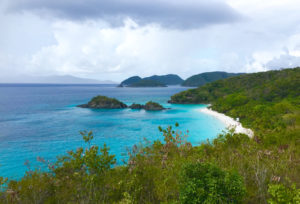
When an international list of the world’s most pristine and protected natural places was released last week, the V.I. National Park on St. John was notably absent from it.
For more than four decades, the park was part of the World Network of Biosphere Reserves of the United Nations Educational, Scientific and Cultural Organization – known as UNESCO – but it was voluntarily removed this year when it could not meet the guidelines to maintain the designation.
According to the network’s website, the designation “works to foster the harmonious integration of people and nature for sustainable development through participatory dialogue, knowledge sharing, poverty reduction, human well-being improvements, respect for cultural values and by improving society’s ability to cope with climate change.”
This year the International Coordinating Council of the Man and the Biosphere Program, which oversees the network, designated 23 new reserves, while the U.S. withdrew 17 sites out of its previous total of 47 and Bulgaria withdrew three. Only a total of 18 sites total have been removed from the program by seven countries since 1997.
“Withdrawal is not unusual and other countries have withdrawn sites in the past (the United Kingdom, Austria, Australia, Norway, Bulgaria, Sweden,) often because there was no human population in the reserves or because of lack of support from local communities,” said UNESCO spokesperson Agnès Bardon in a statement.
Jayne Schaeffer, acting superintendent of the park and the V. I. Coral Reef National Monument, explained that the review process had been taking place since 2013. After filling out the necessary paperwork, the U.S. Department of State said the biosphere no longer met the criteria.
“In 2016 the issue was brought up again and we decided that our approach would be to withdraw with the knowledge that we could reapply in the future,” Schaeffer said.
According to Schaeffer, the Park Service did not have the authority to resolve the issues, since they pertain to sustainable development outside the park and creating buffer zones around the reserve. She said the territory was not responsible for the designation.
“We did not reach out to the territory when we withdrew from the biosphere, in hind sight, perhaps mistakenly,” Schaeffer said. “Because the park and monument alone had the biosphere designation, and the designation did not provide the park or territory with support, we didn’t see the need.”
Dawn Henry, commissioner of the Department of Planning and Natural Resources, said that she was not informed of the delisting until the media started asking questions about it. On Thursday morning Henry said she spoke with Schaeffer about the matter for the first time.
“We agreed that we would look into the issue further and what it is the park would need regarding the designation,” Henry said.
Schaeffer said if the Park Service reapplies for designation in the future, it would need help from key stakeholders.
“We consider the territory, through DPNR and the University of the Virgin Islands in particular, to be our partner. If we decide to reapply for designation we will partner with the territory as we do on a regular basis now,” Schaeffer said.
Henry explained that if the park is looking for additional land and marine area, DPNR cannot assist with the issue, since the park already covers half of St. John. If the park needs a buffer zone, Henry said it could potentially reduce its size and use the resulting land and marine area as the buffer.
“This is a designation the parks service had and it voluntarily withdrew – not DPNR – so it’s up to the park to retain the designation,” Henry said.
When asked if losing the designation could hurt the territory’s economy, Schaeffer said, “The park and monument will continue to be the spectacular places they are – protected by virtue of the legislation and proclamation, respectively, that designated them as protected areas.”
Schaeffer continued, “Visitors will continue to come to the islands to visit the park and experience the beauty and resources here.”
The biosphere’s designation wasn’t widely known in the Virgin Islands. Schaeffer said there weren’t promotional materials like signs nor was it advertised.





